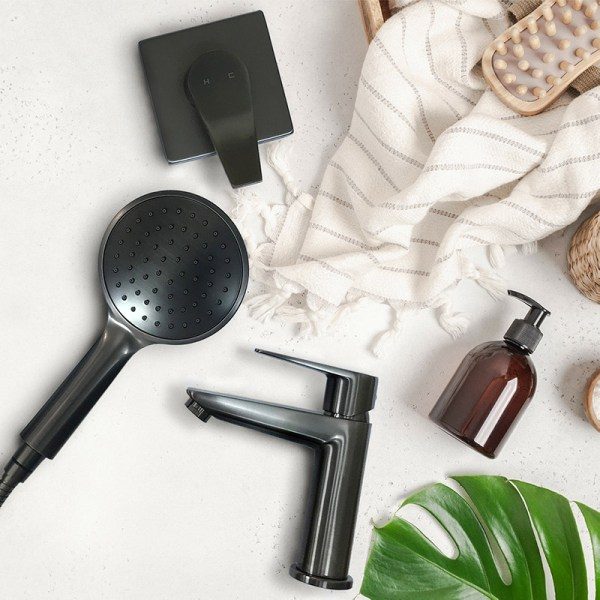TAPWARE CARE INSTRUCTIONS
While FORENO. Tapware uses advanced machining and finishing tools and technology in the manufacture of our products, the surfaces remain susceptible to damage caused through the use of abrasive, alkaline, and acidic cleaning products. Many cleaning products that are sold through retail stores for cleaning bathrooms and kitchens contain chemicals and ingredients that can be damaging to the finely finished surfaces found on your tapware. This includes many cleaning products branded “natural”, “eco”, or “organic”.
To maintain the as-new appearance of your kitchen and bathroom tapware for many years to come it is important to follow these simple care instructions:
- To clean the surface from any marks (toothpaste, waterspots, food deposits etc), use a clean, soft cloth, that has been rinsed in warm water and wrung out well, and gently wipe clean. A mild soap solution may also be used on occasion. We recommend wiping down your kitchen mixer on a daily basis with clean dishwashing water before washing your dishes.
- Do not use Microfibre cloths to clean or polish the surface of your tapware. These can carry fine particles and scratch the surface coating.
- Do not use acidic, caustic/alkaline, abrasive or citric cleaners. This includes bathroom and shower spray cleaners, cleaning powders, cleaning pastes, polishing agents, silica based cleaners, or cream based cleaners and cleansers. These can damage the coating and cause premature failure of the surface coating.
- Do not use products designed to remove tarnish or rust.
- Do not use bleach or chlorine based cleaners.
- Do not use cleaners containing hydrochloric, hydrofluoric, butyric, or phosphoric acids. These can be found in mould removers/cleaners, ceramic cleaners, glass cleaners, and grout and tile cleaners.
- Do not use scouring pads, scrub pads, or steel wool.
- Do not use solvent based cleaners, including ethanol, butyl, or methanol based formulas.
- Do not use disinfectants. Many of these contain chlorine and alcohol based ingredients.
- Do not use cleaning wipes, alcohol wipes, hand wipes, or disinfectant based wipes.
Purity Outdoor 316 Brushed stainless:
316 Stainless Steel is more resilient to tarnishing and corrosion however can still be susceptible to surface corrosion, pitting, and tea-staining (discolouration caused by minor corrosion). The surface must be cleaned regularly with diluted liquid detergent and dried with a soft cloth.
Surface buildup, saltwater spray, oxidation, and/or tea-staining should be removed with use of a suitable stainess steel cleaner and protector. Any damage caused through use of an unsuitable cleaner, or inadequate cleaning will not be covered by warranty.
Hard Water in New Zealand and Its Impact on Tapware Finishes
Hard water, which contains high concentrations of calcium, magnesium, or other minerals, is present in several regions of New Zealand, particularly in Canterbury, parts of Waikato (Tauranga and coastal areas), and Hawkes Bay. Some areas with groundwater-fed supply, bore-water or spring-water, coastal areas with acid sulphate soils, and areas with high chlorine content in their water can also exhibit issues with finishes. While safe to drink, hard water can be particularly harsh on tapware.
Damage to Tapware Finishes:
Hard water leaves behind mineral deposits (commonly referred to as limescale) on exposed surfaces. These deposits are not only unsightly, appearing as white, chalky marks or water spots, but can also etch into the finish over time, especially on delicate or textured surfaces such as brushed nickel, matte black, or electroless or electroplated tapware.
Repeated exposure to hard water can lead to:
-
Discolouration and fading of coloured or electroplated finishes.
-
Pitting or corrosion, particularly where minerals become trapped in crevices or textured surfaces.
-
Dullness and loss of sheen on polished or chrome-plated finishes, making them look prematurely aged.
-
Surface degradation, where harsh minerals interact with cleaning chemicals or abrasive cloths used to remove buildup.
-
Compromise protective coatings, allowing corrosion or further damage to take hold.
-
Be difficult or impossible to remove without using harsh chemicals or abrasive scrubbing—both of which can further damage the finish and void warranties.
Warranty Considerations:
Foreno Tapware excludes damage caused by hard water from our product warranties. This includes surface deterioration, finish degradation, and internal component failure resulting from mineral buildup.
Regular cleaning and drying using mild, non-abrasive products and soft cloths is recommened, especially for maintaining the appearance and longevity of specialty finishes.
To avoid ongoing damage to tapware and plumbing fittings, talk to your local plumber about the installation of an appropriate water treatment system or water softener.
Care should also be taken to avoid knocking the finish with hard objects – pots, pans, cooking utensils, kettles etc, can chip or damage the finish on kitchen mixers so avoid making contact with the tapware with hard or metallic objects.


